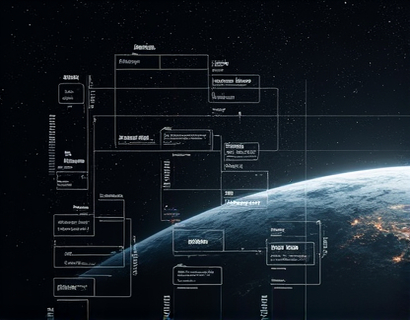Navigating Economic Prosperity in Modern Ecosystems: Insights for Market Success
In the rapidly evolving landscape of modern economies, understanding the complex dynamics of economic ecosystems is crucial for professionals across various fields. This comprehensive guide aims to provide deep insights and strategic strategies for navigating these dynamics, essential for those in economics, business, finance, and industry. The goal is to help identify and capitalize on emerging market opportunities while staying competitive in an ever-changing economic environment.
Understanding Modern Economic Ecosystems
Modern economic ecosystems are intricate networks of interconnected entities including businesses, consumers, governments, and technological platforms. These ecosystems are characterized by their dynamic nature, where innovation, globalization, and digital transformation play pivotal roles. Unlike traditional economic models, modern ecosystems are fluid and adaptive, requiring a nuanced approach to analysis and strategy.
The concept of an economic ecosystem encompasses not only the production and consumption of goods and services but also the flow of information, capital, and resources. This holistic view is essential for comprehending how different components interact and influence one another. For instance, technological advancements can disrupt traditional industries, creating new opportunities while rendering some business models obsolete.
Key Drivers of Economic Prosperity
Several key drivers contribute to economic prosperity within modern ecosystems. Innovation is at the forefront, driving productivity gains and creating new markets. Technological advancements, particularly in areas like artificial intelligence, blockchain, and the Internet of Things, are revolutionizing how businesses operate and how value is delivered to consumers.
Another critical driver is globalization, which facilitates the flow of capital, goods, and services across borders. This interconnectedness opens up new markets and sources of growth but also introduces challenges such as increased competition and regulatory complexities. Adapting to global trends and leveraging international opportunities is vital for sustained success.
Sustainability is increasingly becoming a cornerstone of economic prosperity. Consumers and investors are increasingly demanding environmentally responsible and socially conscious practices. Businesses that integrate sustainable practices into their core operations not only mitigate risks but also attract a growing segment of ethically minded consumers and investors.
Strategic Approaches for Market Success
To navigate the complexities of modern economic ecosystems and achieve market success, several strategic approaches are essential. First, embracing a culture of innovation is crucial. This involves fostering an environment where creativity and experimentation are encouraged. Companies should invest in research and development to stay ahead of the curve and identify new opportunities before competitors do.
Second, building strong partnerships and collaborations can significantly enhance market positioning. Collaborating with other businesses, research institutions, and government bodies can lead to shared knowledge, resources, and expertise. These partnerships can help in navigating regulatory landscapes, accessing new markets, and developing cutting-edge solutions.
Third, data-driven decision-making is paramount in today’s information-rich environment. Leveraging big data and advanced analytics can provide valuable insights into consumer behavior, market trends, and operational efficiencies. By harnessing data effectively, businesses can make informed decisions, optimize processes, and tailor their offerings to meet market demands.
Identifying and Capitalizing on Emerging Opportunities
Emerging opportunities in modern economic ecosystems are numerous and varied. One significant area is the digital transformation of traditional industries. For example, the healthcare sector is seeing a shift towards telemedicine and personalized medicine, driven by technological advancements and changing consumer preferences. Businesses that can adapt to these trends and offer innovative solutions stand to gain a competitive edge.
Another promising area is the growth of the green economy. As environmental concerns become more pressing, there is a increasing demand for sustainable products and services. Companies that invest in renewable energy, eco-friendly materials, and sustainable practices can tap into this growing market and position themselves as leaders in corporate responsibility.
Furthermore, the rise of e-commerce and digital platforms continues to reshape the retail landscape. Businesses that optimize their online presence, enhance customer experiences through digital tools, and adopt agile supply chain management can thrive in this new retail environment. The ability to deliver seamless omnichannel experiences is becoming a key differentiator.
Staying Competitive in a Dynamic Landscape
Maintaining competitiveness in a dynamic economic landscape requires continuous adaptation and resilience. One effective strategy is to cultivate a flexible organizational structure that can quickly respond to changes in the market. This involves flattening hierarchies, empowering employees, and fostering a culture of agility and responsiveness.
Investing in talent and developing a skilled workforce is another critical factor. In a technology-driven economy, having employees with the right skills and the ability to learn and adapt is essential. Companies should prioritize employee development and create opportunities for continuous learning and growth.
Lastly, staying informed about global economic trends and regulatory changes is vital. Economic policies, trade agreements, and geopolitical events can have significant impacts on business operations. By maintaining a proactive stance and staying ahead of these developments, businesses can better navigate potential risks and capitalize on new opportunities.
Conclusion
Navigating economic prosperity in modern ecosystems requires a multifaceted approach that combines innovation, collaboration, data-driven decision-making, and a focus on sustainability. By understanding the key drivers of economic success and adopting strategic approaches, professionals can identify and capitalize on emerging market opportunities. In a rapidly changing world, the ability to adapt and thrive in diverse economic environments is not just an advantage—it is a necessity.










































